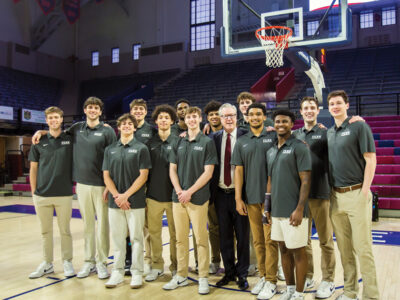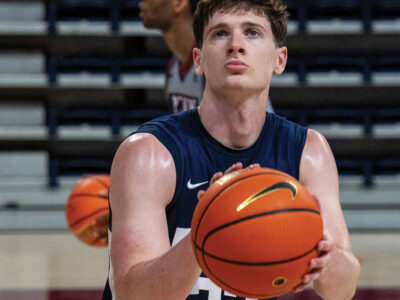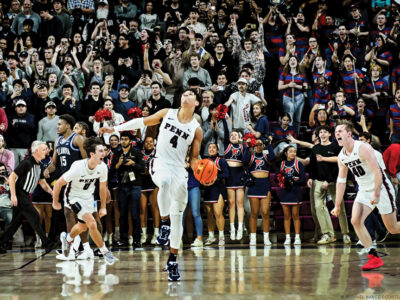Men’s basketball looks as strong as last year’s Ivy champs.
By Noel Hynd
“We love playing the toughest teams,” senior point guard Michael Jordan said recently. “We live for this. We like to prove to the nationally ranked teams that we can play with them.”
Jordan and the rest of the impressive Penn men’s basketball squad that Coach Fran Dunphy has assembled will get their wish early—and often—this season.
Penn won the Ivy title last year, with a record of 13-1 in league play (21-6 overall), and once again will be the team the other Ivy schools—notably Dartmouth, which returns four starters, and our traditional hoop playmates from Tigertown—will be gunning for. But the Quakers will not have a moment to consider any of last year’s laurels, much less rest upon them. The season opener is against Kentucky on Nov. 17, a game that should be broadcast somewhere on your cable TV system. Then there’s Penn State, California (at the Golden Bear Classic at Berkeley, Dec. 28-29) and Kansas, not to mention old Big 5 foes Temple, Villanova and St. Joe’s.
“Is Penn coach Fran Dunphy a bit of a sadist?” asked a writer recently in one of the national college-basketball yearbooks. The answer is no—but the coach does know how to get his team ready for post-season with an early tough-as-nails, non-conference schedule.
Reaching the post-season is a distinct possibility again this year. (Much as I’d like to say probability, I learned long ago to limit my use of the word to statistics classes and keep it out of sports columns.) Among the 21 wins achieved by last year’s Quaker squad was one that snuffed a 17-game losing streak to Temple; they also were impressive in narrow losses to Kansas and to Florida in the first round of the NCAA tournament. And—just for fun—I might as well remind everyone that the 25-point Penn victory at Princeton last year was Princeton’s worst home loss ever at Jadwin. (We won’t discuss last year’s game against Princeton at the Palestra.)
In any case, this year’s team can be just as successful as last year’s Ivy champs, if not more. But the cast has changed a bit.
The foundation for this year’s team are the three starters from last year who will return:
In the backcourt, Michael Jordan led the Quakers last year in every important statistical category: points, assists, steals and minutes played. For the second year in a row, he was first-team All-Ivy and Big 5 selection. Then there are the intangibles: When the team needs a special something from Mr. Jordan, the team gets it. Typical: In the win against Temple last year, Jordan played the entire 45 minutes of the overtime game and was 4-4 from three-point territory.
Senior Matt Langel returns to fill the other starting position in what looks to be (again) the best backcourt in the Ivy League, and one of the best in the country. Langel started all 27 games for Penn last year, shooting 44 percent from the field and 42.9 percent from three-point range. Last year, Langel also demonstrated a flair for making the late crucial shot to put a win away—notably against Harvard, La Salle and St. Joe’s.
Up front at the center position, one prays for the continuing good health of senior center Geoff Owens.
Having the 6-foot-11-inch Owens in the line-up is much like stationing an aircraft carrier in front of the net Penn is defending: Opponents just can’t get in to get a good shot that often. Last year, Owens set a new Penn record with 58 blocked shots. His total as a freshman three years ago (40) is still the fourth best season’s mark. Geoff’s nickname is “Big.” Get the idea?
Two years ago, Owens sat out the season due to a health problem. Last season, he fractured his jaw in the Dartmouth game diving for a loose ball. Following surgery, he did not miss a game (or a practice); in fact, one week after surgery he scored 14 points and grabbed seven rebounds against Princeton in the title-clinching final game of the season. Without Owens in the line-up two seasons ago, opponents shot nearly 46 percent from the field against the Quakers. Last year, with Owens back, opponents shot 40.7 percent.
Unlike last year, when Owens needs a breather this season, Coach Dunphy has another large individual to plant at the center position: Oggie Kapetanovic, a 6-foot-10-inch, 225-pound junior who transferred from Brown and sat out last year. He also might be part of the answer to Dunphy’s biggest question: Who replaces Paul Romanczuk W’99 and Jed Ryan, the starting forwards from last year?
Kapetanovic put up very respectable numbers as a freshman and sophomore at Brown. So, in addition to spelling Owens at center, he will compete with 6-foot-8-inch freshman Ugonna Onyekwe for the power forward position. Onyekwe, from London, England, via Mercersberg Academy in Pennsylvania, was sought by several top-25 programs in the U.S.
But there are several other contenders who could start and will definitely see significant playing time. Junior Josh Sanger played in all 27 of Penn’s games last year, started twice, and consistently demonstrated tough physical play when he was on the court. Jon Tross, a junior, played in 11 games last year and showed a knack for running the floor and getting off a good shot. Senior Frank Brown reemerged last season after missing almost all of the two previous years plagued by a knee injury. Last year he played in 23 games, the most since playing in 27 as a freshman. His three-point shot percentage—46.2—was the best on the squad, and (keep your fingers crossed about that knee) he figures to have a lot of playing time this year. Yet another possibility is sophomore Dan Solomito, who played very few minutes last year, but impressed with several of them.
While Ugonna Onyekwe is the only freshman with a chance at starting this year, Penn has five other incoming recruits who not only figure to see time on the court, but whose names will sound more familiar in the next few years. This is, in fact, Penn’s most impressive group of incoming freshman in recent memory.
Harold Bailey is an off-guard with an excellent outside shot. Dave Klatzky, a point guard, has a reputation as a fine outside sniper. Andrew Coates and Koko Archibong had stellar high-school careers in the forward position, while Duane King can play both forward and guard with considerable athleticism. In sports, potential means “haven’t done it yet,” but there’s quality hoop material here. Some games may be more interesting in the way they give us a preview of the future than in the actual final scores.
The bottom line: Look for another fine Penn team and don’t pay too much attention to the early season record.
Noel Hynd C’70 writes on sports for the Gazette.




